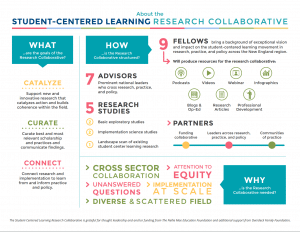Launching the Student-Centered Learning Research Collaborative
CompetencyWorks Blog
 There is increasing evidence supporting the growth of student-centered learning (competency-based learning is one of the four elements) to promote success for all students and drive equity in education. Yet, work remains. How can we curate research-based best practices for implementation? How can we scale student-centered learning, knowing implementation varies based on local contexts? How do we intentionally foreground equity in new school designs to prevent defaulting to the status quo? How can we overcome barriers from policy and the traditional system?
There is increasing evidence supporting the growth of student-centered learning (competency-based learning is one of the four elements) to promote success for all students and drive equity in education. Yet, work remains. How can we curate research-based best practices for implementation? How can we scale student-centered learning, knowing implementation varies based on local contexts? How do we intentionally foreground equity in new school designs to prevent defaulting to the status quo? How can we overcome barriers from policy and the traditional system?
In early November, Jobs for the Future, in partnership with the Nellie Mae Education Foundation, launched the Student-Centered Learning Research Collaborative, a new effort to investigate and evaluate what we know about student-centered learning and leverage that knowledge to effect meaningful change at scale. For more information on the Research Collaborative, view their concept paper.
The goals of the Research Collaborative are three-fold:
- Catalyze: Support new and innovative research that catalyzes action and builds coherence within the field.
- Curate: Curate best and most relevant scholarship and practices and communicate findings.
- Connect: Connect research and implementation to learn from and inform policy and practice.
JFF hosted a convening to announce this new Research Collaborative including researchers, experts, practitioners, funders, and policymakers to bridge the gap and create dialogue between research and practice. The following nine Distinguished Fellows will take on this work over two years:
- Arthur Eduardo Baraf, Principal, The Met
- Dana L. Mitra, Professor and Director of Graduate Studies, Penn State University
- Frank Labanca, Principal, Westside Middle School Academy Magnet
- Jennifer Fredricks, Professor, Connecticut College
- Kei Kawashima-Ginsberg, Director, of Center for Information and Research on Civic Learning and Engagement (CIRCLE), Tufts University
- Kim Carter, Executive Director, Q.E.D. Foundation (Read about Making Community Connections Charter School here)
- Lori Batista McEwen, Outgoing Chief of Instruction, Leadership and Equity, Providence Public School Department
- Mary Bellavance, Instructional Coach, Biddeford Middle School (Read about Biddeford School District here)
- Michelle L. Puhlick, Executive Director of Planning & Partnerships, Hartford Public Schools
The Research Collaborative also created the following group of seven highly respected senior leaders, scholars and educators to serve as Advisors, providing invaluable perspectives regarding research questions, progress, and deliverables:
- Alison Hramiec, Head of School, Boston Day and Evening Academy (Read about BDEA here)
- Paul Leather, Deputy Commissioner of Education, New Hampshire
- Jal Mehta, Associate Professor, Harvard Graduate School of Education
- Beth M. Miller, Managing Director of Research and Communications, EL Education
- James W. Pellegrino, Co-Director, Learning Sciences Research Institute; Distinguished Professor of Education
- Paul Reville, Francis Keppel Professor of Practice of Educational Policy and Administration, Harvard Graduate School of Education
- Jorge Ruiz de Velasco, Associate Director of the Gardner Center for Youth and Their Communities, Stanford Graduate School of Education
Three Takeaways from the Convening
- Focus on Equity: Equity was a key theme throughout the many conversations at the convening. What do we mean by ‘equity’ and how do we know when we get there? How do we ensure that equity is an explicit goal in school design research to prevent defaulting to the status quo? How can we anticipate and address possible unintended consequences in personalized, competency-based systems? It’s important to remember that educational equity does not exist in a vacuum; there are also inequities that students face in their environments outside the realm of traditional education.
- Lack of Empirical Data: To effectively design and scale personalized, competency-based systems, we need empirical data to demonstrate its effectiveness on student outcomes, particularly for historically underserved groups. This Research Collaborative hopes to find research-backed strategies to improve equity in student-centered learning.
- Defining Key Terms: Different definitions are sometimes used by different groups of people, causing confusion and misunderstandings. Practitioners, policymakers, and researchers need to come to a common language to talk across boundaries. When networks talk past one another, it becomes difficult for research to inform practice and for practice to inform research.
Learn more about the Research Collaborative: